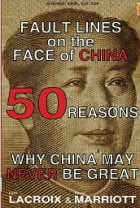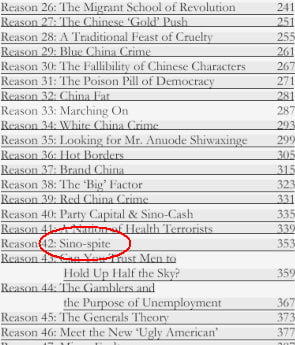After recent months of mouth-frothing, hair-tearing, screeching and ranting about the South China Sea, the Diaoyu/Senkaku Islands and Liu Xiaobo’s Nobel Peace Prize, Beijing freaks out about being accused of freaking out.
This phenomenon of a grim, insecure and overly defensive Middle Kingdom throwing a temper tantrum at the slightest provocation has been given the name ‘Sino-spite’. The phrase comes from a hefty polemic I am just finishing called Fault Lines on the Face of China: 50 Reasons Why China May Never be Great, by Karl Lacroix and David Marriot (the infamous Chinabounder). ‘Sino-spite’ is the title of one of the book’s more enlightening chapters.
Hyper-sensitivity over territorial claims largely based on fanciful or irrelevant historical records (coming soon: Arunachal Pradesh) is but one spark for such entertaining ructions. Another, of course, is the dreaded interference in internal affairs that takes place at the shake of the Dalai Lama’s hand, unauthorized hosting of an independent film-maker, or merest uncomplimentary comment about the world’s next superpower. And then there’s the closely related hurting of the Chinese people’s feelings that often follows such slights. Let slip that Taiwan looked pretty independent last time you visited, use the more conservative estimated number of victims of the 1937 Rape of Nanjing, or insist too strongly that Genghis Khan was not Chinese, and you will find yourself committing similar – or in time, maybe, brand new – sins against the glorious and invariably correct People’s Republic.
 The Fault Lines chapter on Sino-spite also examines Mainland officials’ even less attractive habit of treating complaints about the country’s products as personal insults motivated by evil, bullying foreigners’ desire to keep China down. The indignant and aggressive outbursts in response to concerns about tainted toothpaste and dangerous children’s toys are not so much entertaining as disturbing. Rather than follow simple basics of public relations and expressing at least a hint of concern for overseas consumers’ well-being – let alone a dash of contrition – these statements denounce product withdrawals and bans as hostile and unfriendly acts intended to smear or unfairly discriminate. There is a way of avoiding headlines like ‘China is Trying to Poison Our Babies’, but this isn’t it.
The Fault Lines chapter on Sino-spite also examines Mainland officials’ even less attractive habit of treating complaints about the country’s products as personal insults motivated by evil, bullying foreigners’ desire to keep China down. The indignant and aggressive outbursts in response to concerns about tainted toothpaste and dangerous children’s toys are not so much entertaining as disturbing. Rather than follow simple basics of public relations and expressing at least a hint of concern for overseas consumers’ well-being – let alone a dash of contrition – these statements denounce product withdrawals and bans as hostile and unfriendly acts intended to smear or unfairly discriminate. There is a way of avoiding headlines like ‘China is Trying to Poison Our Babies’, but this isn’t it.
The other 49 chapters (‘reasons’) in Fault Lines tend towards successions of horror stories on everything you would expect: sex ratios, single kids, censorship, migrant workers, pollution, fakes, schooling, corruption and every other systemic failure and injustice in China (the authors whittled them down from over 70). You could pull together a similar litany of unpleasantness for any country (5 Reasons Why Botswana Sucks, or 10 Reasons Why Denmark’s a Dud), but of course it’s much more fun when it’s a place with at least its 22% share of the world’s human tragedy and bad governance. It goes without saying that the authors have a grudge or 10.
In sum, the book is of curiosity rather than academic value (the Japanese like it, apparently). It would be numbing to read straight through. But for the starry-eyed or nervous who see China’s rise to international might as a given, it’s a good antidote to dip into. If nothing else, we now have a phrase for all that over-the-top indignant fury that brightens up our days so frequently.



If “Being A Crybaby Cooper” was introduced as an Olympic event, you could pretty much guarantee that the teams making it to the podium would comprise Scousers (?gold), Jews (?silver) and Mainland Chinese (?bronze).
Wow, compare and contrast the thoughtful and non-nationalistic comments from the Indian readers of the Arunachal Pradesh story to the flag waving, bullying, Sino-spite nonsense on any blog where China is highlighted in non-hagiographic terms. Very interesting.
“Tory multimillionaire witch-hunts welfare claimants…”
Dunno why, but my feelings were hurt, when I read the above headline…guess my name is seriously busy-body…
‘It goes without saying that the authors have a grudge or 10’?
Not really. Maybe we just love the country enough to make it known to all and sundry the problems they have to deal with.
After all only dissenting Chinese expats would be able to write such a book since no one inside China would dare.
And actually Taiwain loves this book – selling over 11,000 copies in a very small market.
Good review!
Karl Lacroix